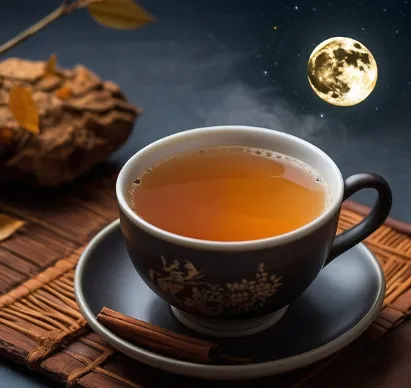
Are you tired of tossing and turning all night? Do you struggle to fall asleep and stay asleep? asleep? If so, your not alone. Millions of people worldwide experience sleep problems, and many are turning to natural remedies like herbal tea to improve their sleep quality.A Nighttime Ritual with Calming Herbal Tea
Herbal teas have been used for centuries to promote relaxation and better sleep. These soothing beverages contain a variety of compounds that can help calm the mind, reduce anxiety, and improve sleep quality. In this article, we’ll explore the science behind sleep and herbal tea, discuss the best herbs for a good night’s sleep, and provide a step-by-step guide on how to make herbal tea for sleep. We’ll also share tips on creating your personalized herbal tea blend and enjoying your nighttime elixir for optimal sleep.
The Science Behind Sleep and Herbal Tea
Sleep is a vital process that allows our bodies and minds to rest and repair. During sleep, our brains consolidate memories, regulate hormones, and boost our immune system. However, many factors can disrupt our sleep patterns, including stress, anxiety, and poor sleep hygiene.
Herbal teas can help improve sleep quality by targeting various factors that contribute to sleep disturbances. Many herbs contain compounds that have sedative, hypnotic, or anxiolytic effects. These compounds can help calm the nervous system, reduce anxiety, and promote relaxation.
Some of the key compounds found in herbs that promote sleep include:
- Glycine: An amino acid that has been shown to improve sleep quality and reduce insomnia.
- GABA: A neurotransmitter that inhibits nerve activity, promoting relaxation and sleep.
- Magnesium: A mineral that plays a role in muscle relaxation and sleep.
- Flavonoids: Compounds with antioxidant properties that can help reduce inflammation and improve sleep.
Choosing the Right Herbs for a Good Night’s Sleep
When choosing herbs for sleep, it’s important to select those that have been traditionally used to promote relaxation and sleep. Some of the most popular herbs for sleep include:
- Chamomile: This gentle herb has been used for centuries to promote relaxation and sleep. Chamomile tea can help reduce anxiety and improve sleep quality.
- Lavender: Lavender is another popular herb for sleep. It has a calming effect on the nervous system and can help reduce anxiety and insomnia.
- Valerian Root: Valerian Valerian root is a powerful herb that has been shown to improve sleep onset and duration. It can also help reduce anxiety and restlessness.
- Passionflower: Passionflower is a calming herb that can help reduce anxiety and promote relaxation. It can also help improve sleep quality.
- Lemon Balm: Lemon balm is a mild sedative that can help reduce anxiety and promote relaxation. It can also help improve sleep quality.
How to Make Herbal Tea for Sleep: A Step-by-Step Guide
Making herbal tea for sleep is a simple and enjoyable process. Here’s a step-by-step guide:
- Choose Your Herbs: Select the herbs that you want to use in your tea. You can use a single herb or a combination of herbs.
- Boil Water: Boil fresh, filtered water in a kettle.
- Steep the Herbs: Place the herbs in a tea infuser or a loose leaf tea filter. Pour the hot water over the herbs and let them steep for 5-10 minutes.
- Strain the Tea: Remove the tea bag or infuser from the cup.
- Add Sweetener (Optional): If desired, add a natural sweetener like honey or maple syrup to taste.
- Enjoy: Sip your calming herbal tea slowly and savor the flavor.
Creating Your Personalized Herbal Tea Blend
You can create your own personalized herbal tea blend by combining different herbs to suit your individual needs. Here are a few ideas for herbal tea blends:
- Calming Blend: Chamomile, lavender, and lemon balm
- Restful Blend: Valerian root, passionflower, and chamomile
- Dreamy Blend: Lavender, lemon balm, nad hops
You can experiment with different herbs and ratios to find the perfect blend for you.
Enjoying Your Nighttime Elixir: Tips for Optimal Sleep
To get the most out of your herbal tea, follow these tips:
- Drink Your Tea Before Bed: Drink your herbal tea about 30-60 minutes before bedtime.
- Create a Relaxing Bedtime Routine: Establish a relaxing bedtime routine that includes activities like reading, taking a warm bath, or listening to calming music.
- Create a Sleep-Conducive Environment: Make sure your bedroom is dark, quiet, and cool.
- Avoid Stimulants: Avoid caffeine, alcohol, and nicotine, especially in the evening.
- Manage Stress: Practice stress-reducing techniques like meditation, yoga, or deep breathing.
Herbal tea can be a powerful tool for improving sleep quality. By understanding the science behind sleep and herbal tea, choosing the right herbs, and following the tips in this article, you can create a calming nighttime ritual that will help you you drift off to sleep peacefully. So, sip, savor, and snooze your way to a good night’s sleep!